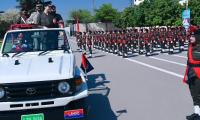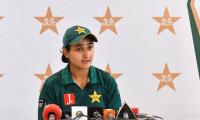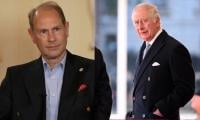Islamabad
Highlighting social and economic vulnerabilities that keep the Pakistani woman underpaid and overworked even when she has overcome structural and social barriers to seek employment, a status report on women’s economic participation and empowerment in Pakistan was launched on Wednesday.
The report titled ‘Women’s Economic Participation and Empowerment-Status Report 2016’ is produced with support from the Governments of Norway and Denmark, by United Nations Entity for Gender Equality and the Empowerment of Women (UN Women) in collaboration with National Commission on the Status of Women (NCSW) at an event jointly hosted by NCSW and the UN Women.
The report emphasises the complex and multifaceted concept of women’s economic empowerment and talks about different dimensions and determinants of economic participation of women such as human, financial and physical capital, employment statistics and vulnerability in employment, gender wage differentials and poverty. The report also documents the economic situation of women affected by humanitarian crises and complex emergencies over the past decade.
The Status Report highlights specific aspects of women’s economic empowerment such as employment, type of employment and wages, vulnerable work and the working poor and recommends a concerted effort to improve women’s access, opportunities and capabilities in order for them to participate as full economic actors in development and growth of a dynamic Pakistan that the Vision 2025 seeks.
UN Women Pakistan Country Representative Jamshed Kazi in his welcome stated that the report captures different facets of women’s economic empowerment from the relations between malnutrition and lesser opportunities in the workforce to the extra burden of humanitarian crisis on women.
“The report delineates a meticulous overview of the working women population of Pakistan. It is imperative to position gender responsive infrastructure in places such as daycare centres, anti-sexual harassment mechanisms, safe and affordable transport and accommodation options to encourage economically inactive women to join the formal workforce as well as ensure retention for the existing women workforce,” he said adding that providing equal opportunities for better quality education is also critical for women and girls to improve their employment options.
Embassy of Denmark Chargé d'Affaires Helle Nielsen said that investing in girls and women is not only the right thing to do but also a smart thing to do, as research shows that investing in girls and women is the most effective investment in development, reaching far beyond the individual women.
She gave the example about how women spend 90 per cent of their salary on their children and the health, education and well-being of their family, while men only spend 30 to 40 per cent. She also highlighted that by removing the barriers that prevent women from entering the labour market, a country’s productivity can increase. “Investing in women’s economical participation is a direct way to gender equality, poverty reduction and inclusive economic growth, but in order for the world to experience progress, we need to give girls and women the equal opportunities to which they are entitled. This will not only benefit girls and women but societies at large”, said Nielsen.
Lead Researcher and Author for the Status Report 2016 and Director, Centre of Gender and Policy Studies, Dr. Yasmin Zaidi, presenting the report highlighted, “Women’s economic work, paid and unpaid, needs to be recognized, acknowledged and tracked at district and provincial levels in Pakistan so that Pakistan can report on SDG 5. Robust data on employment and earnings will allow provinces to plan where to allocate resources so all districts can prosper and generate decent employment, and manage the flow of economic migration within the country,” she said.
Speaking during the panel discussion, panellist and former NCSW chairperson Khawar Mumtaz stated that authentic official data and its analysis are imperative to establish the reality on the ground for giving direction for appropriate policies and action. “The reports significance is the multidimensional approach to the analysis of women's economic empowerment especially employment. This publication also deserves special appreciation for developing the Women Economic Empowerment (WEE) Index for the first time in Pakistan. The Index will help in ranking the WEE status by districts and provide a mechanism to measure progress and pinpoint areas that require more concerted attention.”
Captain, National Women’s Basketball Team, Sana Mahmud spoke of the gender pay gap saying that the wage gap for men and women remains high, even within the realm of sport. “Female athletes — doing exactly what the men are doing — are many at times paid less than their male counterparts. This in turn creates an even more difficult situation for women who are already struggling to participate fully and equally in sports, and are further disillusioned by the lack of incentives provided, including monetary remuneration,” she said.
The chief guest and Chairperson of the Punjab Commission on the Status of Women, Fauzia Viqar, stressed the importance of data collection for informed policies, actions and to measure progress. “This data would surely help us in correct decision-making and we hope that the analysis would inform development schemes of the Government of Pakistan,” she said.
A delegation from Timor-Leste, headed by Ms Veronica Das Dores, Minister of Social Solidarity and Inclusion, on a...
Pakistani Ambassador to China Khalil Hashmi seen in this image. — APP/FileIslamabad:China-Pakistan investment and...
In this image, Child Protection Institute building can be seen. — X/@mohrpakistan/File Islamabad: Child Protection...
The National University of Modern Languages building seen in this image released on November 11, 2022. —...
President of the International Islamic University Islamabad , Prof Dr Hathal bin Hamoud Al-Otaibi, and Rector IIUI, Dr...
A representational image of a handcuffed person behind bars. — AFP/FileRawalpindi:In a significant breakthrough,...







